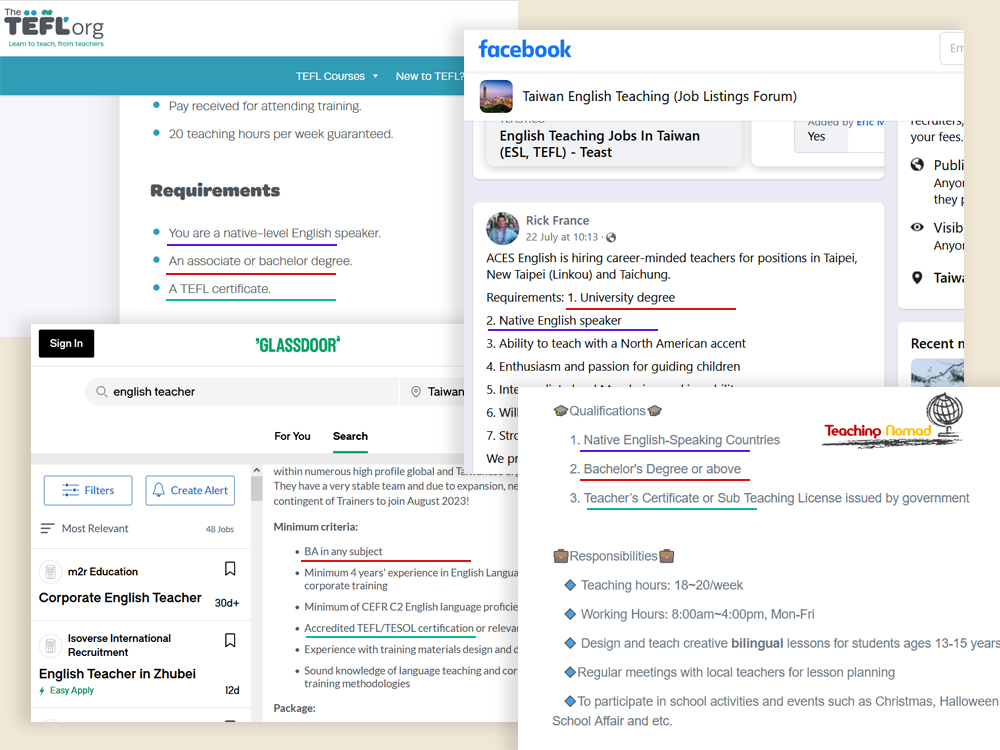Nestled in the heart of East Asia, Taiwan shines as a symbol of culture, technological innovation, and breathtaking landscapes. Among its myriad attractions is the growing demand for English teachers, presenting a great opportunity for educators from across the globe to not just teach but also learn and explore. Venturing into Taiwan’s education space requires understanding, preparation, and the right credentials.
Teaching English in Taiwan, whether in bustling Taipei, historical Tainan, or vibrant Hsinchu, is not just about imparting language skills; it’s an immersion into a harmonious blend of old and new. It’s walking through lantern-lit streets after a day’s lesson at local schools, hearing the echoes of Mandarin interlaced with enthusiastic English phrases from motivated students. However, embracing this role demands specific qualifications and a roadmap to ensure teachers are equipped to inspire.
This article unveils the comprehensive requirements and qualifications essential to teach English in various school types across Taiwan. From Buxibans (cram schools) to public schools and private institutions to TFETP, the demand for English teachers and English teacher assistants spans a diverse range of educational settings.
The average salary for an English teacher in Taiwan is US$ 2273 (Source: Payscale) – that is, it typically ranges from US$ 2,000 to US$ 3,200 per month, depending on experience, qualifications, and the type of institution. So, whether you’re an experienced teacher looking to work in city schools or a fresh graduate eager to explore the scenic beauty of Taichung – Taiwan has something special to offer.
Let’s dive deeper to understand the requirements and qualifications to stand in front of a Taiwanese classroom confidently. Together, let’s embark on an enlightening journey, bridging worlds through the universal language of education.
Qualifications to be an English teacher in Taiwan
- A bachelor’s degree
- Be a native English speaker or near-native with proof of fluency
- Hold a TEFL certification (CELTA, CertTESOL preferred)
- Have a clean criminal background
- Qualify for an appropriate visa (work permit + ARC)
- A medical certificate
- A teaching license (not mandatory)
- Previous teaching experience (not mandatory)
- Knowledge of Mandarin Chinese (not mandatory)
Meeting the above requirements prepares you for a rewarding career as an English teacher in Taiwan. You’ll be responsible for teaching enthusiastic students and immersing yourself in the vibrant Taiwanese culture. Teaching English in Taiwan offers a delightful mix of both traditional and modern touch, making it an exciting and diverse adventure for teachers.
Imagine teaching English in bustling cities like Taipei or scenic suburbs like the Maokong and Beitou. Taiwan has something for every teacher, providing a rewarding teaching experience with competitive salaries and a warm, welcoming community.
Let’s explore each of the above requirements in detail to find your perfect teaching opportunity in Taiwan!

Look at the above picture, a collage of a few job listings from reputed websites. It is clear that in Taiwan, ESL employers eagerly seek English teachers with these three qualifications: a bachelor’s degree, native English fluency, and a TEFL certificate. These requirements showcase your academic prowess and language finesse. But here’s the cherry on top: while not compulsory, possessing previous teaching experience, Mandarin knowledge, and extra certifications will give you an advantage over other fellow teachers, especially in this highly competitive ESL job market in Taiwan.
1. Bachelor’s Degree From an Accredited Institution
A basic prerequisite for teaching English in Taiwan is a bachelor’s degree. In Taiwan’s educational system, a Bachelor’s degree from a recognized institution is not merely a formality – it’s a distinction.
Language schools and institutions across Taiwan view this qualification as an integral marker of a candidate’s dedication and rigor. At its core, having a degree signals a foundational level of academic proficiency and discipline – attributes highly esteemed by Taiwanese schools. Furthermore, in the eyes of many Taiwanese employers, a degree, regardless of the major, represents a candidate’s exposure to structured learning, critical thinking, and diverse cultural perspectives – skills invaluable in any classroom environment.
It’s no surprise that when schools in cities like Taipei, Kaohsiung, or Wulai sift through potential hires, a Bachelor’s degree invariably is a strong influencer in their decision-making process. In the competitive world of teaching English in Taiwan, this qualification isn’t just a tick on a checklist; it’s an emblem of credibility, shaping your standing amidst a sea of aspiring teachers.
Can I teach in Taiwan with an Associate degree?
While a Bachelor’s degree is the standard requirement for teaching in Taiwan, there are instances where an Associate degree, combined with a TEFL certificate, might be accepted, especially in private language schools. However, for those without a Bachelor’s degree, opportunities can be limited. Therefore, it’s essential to research specific school criteria to find the right fit.
2. Native English Speaker or Proof of Fluency
While being a native English speaker is preferred, it is not mandatory for teaching English in Taiwan. In Taiwan, above all, the authenticity of language instruction is of utmost importance. For many institutions, particularly those in bustling urban centers like Taipei or Kaohsiung, having a fluent English speaker leading the classroom offers students an authentic cultural and linguistic experience.
It’s akin to offering them a direct ticket to the heart of English-speaking lands, be it the bustling streets of London or the vast expanses of the Australian outback. However, Taiwan’s commitment to quality education goes beyond just native speakers. Schools, particularly those in cities such as Tainan and Taichung, also value teachers who, though not native, exhibit an impeccable command over the language.
Possessing recognized fluency certifications such as the IELTS, TOEFL, and TOEIC assures schools of your capability, ensuring students receive an education that’s genuine, proficient, and culturally enriched.
Can non-native English speakers apply for English teaching positions in Taiwan?
Yes, non-native English speakers can apply as long as they demonstrate a high level of English proficiency and possess the necessary qualifications.
3. TEFL Certification
A TEFL (Teaching English as a Foreign Language) certification is a widely accepted teacher training qualification for educators looking to teach English in Taiwan. For many language and international schools, particularly in metropolises like Taichung or Taoyuan, a TEFL, CertTESOL, or CELTA certification serves as a clear sign of their unwavering commitment to achieving excellence in English instruction.
While not always a strict prerequisite, especially in certain public schools or more remote areas, possessing one of these certificates undeniably elevates an applicant’s profile. Why? Because they signify more than just theoretical knowledge, they indicate at least 120 hours of rigorous TEFL study, hands-on teaching practice, and a deep understanding of diverse classroom dynamics.
In regions like Tainan or Hualien, where local Buxibans (cram schools) might be more flexible with their requirements, such a TEFL certification can be a distinct advantage. In Taiwan’s vast educational landscape, this isn’t merely a credential – it’s a declaration of your dedication to shaping young minds with proficiency and passion.
Is an online TEFL certification accepted in Taiwan?
Yes, many language schools and institutions in Taiwan accept online TEFL certifications as long as they meet certain criteria. Choosing a reputable TEFL course with a minimum of 120 hours of training, including practical teaching components, is essential. Always verify the specific requirements of the school or institution you are applying to.
Are in-class courses preferred over online ones?
While some employers may prefer in-class TEFL courses for their practical teaching components and face-to-face interaction, many language schools and institutions in Taiwan accept both in-class and online TEFL certifications. The key factor, indeed, lies in the quality and content of the course, making sure it meets the necessary hours of training and comprehensively covers essential teaching methodologies. Ultimately, what matters most is the candidate’s ability to demonstrate proficiency in teaching English effectively.
4. Clean Criminal Background
Trust is the bedrock of Taiwan’s educational system. From the bustling corridors of Taipei’s elite institutions to the close-knit classrooms of rural Miaoli, ensuring the safety and integrity of the learning environment remains paramount. Enter the criminal background check – a key document that resonates deeply with schools, Buxibans, and language centers across the island.
While it might seem like a mere procedural step, in the eyes of Taiwanese administrators, it’s an affirmation of an educator’s credibility and moral standing. Public schools, private institutions, and even smaller local cram schools in places like Anping and Yilan place immense emphasis on this check.
It’s all about establishing a foundation of trust. For potential educators, presenting a clean criminal record is more than just showcasing a blemish-free past; it’s a testament to their commitment to upholding the values and safety standards cherished by Taiwan’s vibrant educational community.
5. Appropriate Visa
In the process of securing a teaching position in Taiwan, one cannot underscore enough the significance of obtaining the right visa. With its commitment to fostering a robust educational environment, Taiwan has streamlined procedures to ensure qualified educators can navigate this path seamlessly.
Most teachers aim to obtain the Alien Resident Certificate (ARC), (issued by the National Immigration Agency) and this process relies on first securing a work permit – typically assisted by schools. This ARC is not just a visa; it’s the golden ticket that legitimizes your teaching status and interlinks various aspects of life in Taiwan, from opening bank accounts to accessing health services.
Now, to the heart of the matter: that is, the visa procedure. Firstly, potential teachers must secure a teaching job, as the employing institution acts as the sponsor for the work permit, a precursor to the ARC. Documents you’d generally need include a copy of your passport, a health check-up certificate, your degree, and your TEFL certification. Some institutions might also request a verified criminal background check.
While the process can initially seem daunting, Taiwan has fine-tuned this system (of visa processing) over the years, driven by its aspiration to attract top teaching talent. Once you’ve successfully obtained the right visa, Taiwan welcomes you to immerse in an enriching teaching journey.
Can I teach without a work permit in Taiwan?
No, teaching in Taiwan without a valid work permit is illegal. To teach English legally in Taiwan, you must obtain a work permit sponsored by your employing institution, a crucial requirement to ensure compliance with Taiwanese laws and regulations.
How long is the typical teaching contract in Taiwan?
Usually, the teaching contract in Taiwan lasts for one year. Schools value continuity in education, so a one-year commitment ensures student stability. While some institutions offer shorter terms, embarking on a year-long teaching contract in Taiwan provides educators with a more comprehensive and enriching experience, both professionally and culturally, in this vibrant nation.
6. Health Check and Medical Certificate
Taiwan places immense value on the well-being of both its residents and its teachers. As a prospective teacher stepping into the diverse classrooms of this island nation – from the sprawling schools of Taipei to the intimate settings of Taitung – it’s imperative to meet certain health standards set by the Taiwanese authorities, ensuring a healthy environment for its students.
Typically, this health check is comprehensive. Potential educators can expect tests that cover a broad spectrum, including a chest X-ray (to rule out tuberculosis), blood tests (checking for serious communicable diseases like HIV), and sometimes even substance abuse tests. Additionally, a general physical examination ensures that the teacher is fit for the demands of the job.
The procedure usually requires a visit to a designated or recognized hospital in Taiwan, ensuring uniformity and authenticity in the tests. While initially conducted during the visa application process, some schools or institutions might mandate periodic checks, especially if one renews their contract or visa.
7. Teaching License
When seeking a teaching job in Taiwan, the relevance of a teaching license often comes to the fore. To clarify, while possessing such a license from your home country amplifies your qualifications, it’s not an absolute requirement for most language schools or Buxibans (cram schools) in Taiwan.
Typically, these institutions prioritize Bachelor’s degrees and TEFL certification candidates. However, having a teaching license can undeniably enhance your prospects when setting sights on Taiwanese public schools or some prestigious private establishments.
In these specific settings, holding a license not only opens doors to opportunities but also positions you for higher remuneration, making it a valuable asset for English teachers in Taiwan. In essence, while a teaching license isn’t mandatory across the board, it does serve as a significant asset in the more competitive teaching landscapes of Taiwan.
8. Previous Teaching Experience
Previous teaching experience isn’t a strict prerequisite for English teaching positions in Taiwan. However, it undoubtedly acts as a feather in your cap when navigating the job market there. And while previous teaching experience certainly shines as a golden feather in one’s cap, Taiwan warmly welcomes all new teachers looking to begin their teaching careers. Yes, you heard it right: teaching experience is not always mandatory.
Many successful teachers in Taiwan started their careers with nothing but passion and a burning desire to make a meaningful impact. Their stories bear testimony to the fact that what truly matters is enthusiasm, adaptability, and a genuine love for teaching. If you find yourself in this boat, fresh and eager to embark on this teaching voyage, fret not. Opportunities abound for budding educators.
To set the ball rolling, consider seeking positions that offer mentorship or on-the-job training. Many schools and language centers value potential and are willing to mold and shape newcomers into seasoned professionals. Additionally, leveraging platforms dedicated to TEFL job listings in Taiwan can be an excellent starting point. Remember, every master was once a beginner. With determination and the right approach, you, too, can carve a niche in Taiwan’s dynamic ESL landscape.
9. Knowledge of Mandarin Chinese
A helpful insight but not a deal-breaker. Diving into Taiwan’s educational scene is an experience rich in cultural immersion. And while a grasp of Mandarin Chinese can be an enriching asset, paving the way for deeper connections and insights, it’s essential to underscore that it isn’t a compulsory criterion. Taiwan’s focus is clear: proficiency in English instruction.
Yet, for those curious souls who venture beyond the classroom walls, having a foundational understanding of Mandarin can undoubtedly open doors, fostering stronger bonds with students and the community. It allows teachers to easily navigate local nuances and blend seamlessly into Taiwan’s vibrant culture.
However, Taiwan’s embrace remains warm and welcoming for the enthusiastic teacher starting without this linguistic edge. Many educators have found success and fulfillment without Mandarin in their toolkit, relying on their dedication to teaching and the universal language of empathy. If the thought of learning intrigues you, Taiwan offers ample avenues to pick up the basics, from local language courses to language exchange meet-ups.
In essence, while Mandarin knowledge can enhance your journey, the heart of teaching in Taiwan beats to the rhythm of dedication, passion, and the will to make a difference.
Age and Nationality Preferences
As one steps into the diverse world of teaching in Taiwan, it’s vital to understand the subtle undercurrents of age and nationality preferences that sometimes ripple through the hiring processes. While the core of Taiwan’s educational ethos is centered on skills and pedagogical excellence, certain institutions might harbor specific preferences largely stemming from cultural perceptions and past experiences.
When it comes to age, while there’s no strict nationwide criterion, certain benchmarks often emerge based on the teaching setting. For instance, language cram schools (known locally as ‘Buxibans’) might lean towards younger educators, typically starting from the early 20s, valuing their zest and rapport with younger students. Conversely, universities and formal institutions might appreciate the gravitas and depth that come with more seasoned professionals.
Regarding nationality, some schools, especially in urban hubs, may lean towards native English speakers, often due to parental expectations or market demands. This includes countries like the USA, UK, Canada, Australia, New Zealand, Ireland, and South Africa.
However, it’s essential to recognize that as Taiwan continues to evolve its educational outlook, the doors are increasingly open to educators from a broader spectrum of nations, provided they demonstrate proficiency and passion for teaching.
Soft Skills Required for English Teachers in Taiwan
- Excellent Communication Skills
- Classroom Management Skills
- Adaptability to Develop Curriculum
- Interpersonal Skills
- Ability to Assist Core Team
- Cross-cultural Sensitivity and Adaptability
- Creative Teaching Techniques
- Digital Fluency
- Provide Effective Feedback
- Passion for Inspiring Students
How to apply for a teaching job in Taiwan?
Embarking on the journey to teach in Taiwan involves a few systematic steps combined with some inside strategies. Here’s a comprehensive guide:
- Job Boards and Websites:
- Tealit: A renowned website tailored for foreigners in Taiwan. It offers job listings, classifieds, and more.
- Dave’s ESL Cafe: A global hub for ESL jobs that includes a section dedicated to Taiwan.
- Recruitment Agencies: Companies like Reach To Teach and Hess International specialize in placing foreign teachers in Taiwan. They provide assistance throughout the process, from interviews to settling down.
- Direct Approach: Consider directly reaching out to language schools (Buxibans) or public schools in cities of interest. Websites of large chains like Kojen and Giraffe often have their recruitment sections.
- Local Networks: Once in Taiwan, leverage expat groups, social meet-ups, and local contacts. Personal recommendations often carry weight.
- Teaching Fairs: Attend international teaching fairs where Taiwanese schools recruit directly.
Alternative Approaches:
- Social Media: Platforms like Facebook have groups like “Expats in Taiwan” or “Taiwan English Teaching Jobs”, which regularly post vacancies (search for these keywords in Google to find the relevant Facebook groups).
- On-the-ground Search: Sometimes, the old-fashioned way works best. Consider arriving in Taiwan on a visitor visa, scouting schools in person, and attending interviews directly. This face-to-face approach can offer an edge.
Pro Tips:
- Learn Basic Mandarin: While not mandatory, showing a willingness to engage with the local language can be a significant plus during interviews.
- Prepare a Strong CV: Highlight any teaching experience or certifications like TEFL, and emphasize skills like adaptability and cultural sensitivity.
Remember, the Taiwan teaching market is dynamic. While online resources are invaluable, don’t underestimate the power of personal connections and on-the-spot initiatives.
Conclusion:
Embarking on a journey to teach English in Taiwan is both an exciting venture and a meaningful decision. As we’ve gone through the qualifications and requirements, it’s evident that Taiwan, with its blend of tradition and modernity, values quality education and the global perspectives that foreign teachers bring. While certain credentials like a bachelor’s degree are non-negotiable, others offer flexibility, ensuring that dedicated educators find their rightful place in the heart of this island nation. As you stand on the cusp of this transformative experience, may your preparations be thorough and your aspirations boundless. Taiwan awaits your unique contribution to its educational landscape.
This article was originally published in Jan-2023 and was last updated in Aug-2023.
Author: Amy Heath




